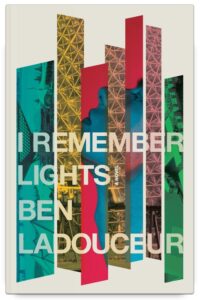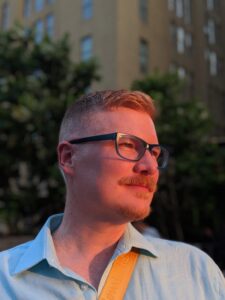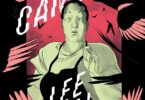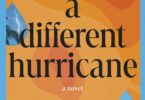 Reviewed by Andrew Woodrow-Butcher
Reviewed by Andrew Woodrow-Butcher
Ben Ladouceur, I Remember Lights (Book*hug Press, 2025), 268 pp., $24.95.
On October 22, 1977, Montreal police raided gay bars Truxx and Le Mystique, arresting all on-site staff and patrons in what was, at the time, the largest mass arrest in Canadian history. Canadian poet and Lambda Award finalist Ben Ladouceur’s debut novel, I Remember Lights, opens earlier that night, at a gay bathhouse elsewhere in the city, where his nameless protagonist meets an attractively naïve visitor from Ottawa. As the pair make their way toward Truxx for a drink, unaware of the police operation about to unfold, their talk turns to Montreal’s glory days the decade previous: Expo ’67.
Back then, Ladouceur’s main character—an introverted 19-year-old New Brunswicker—travels to Montreal for the first time, with a girl to whom he’s expected to propose. He even brings his dead mother’s emerald ring, in case he actually goes through with it. He doesn’t. So she packs up and leaves him—alone, in an unfamiliar city: no cash, no job, no French, no prospects.
His attempt to cobble together a life out of rented rooms and odd jobs coincides with his early forays into Montreal’s gay demi-monde. New to cruising, he is surprised by the expectation of anonymity—“Pas de noms” is the very first rule he learns. He busses at the Reine Elizabeth hotel, alongside worldly, brusque waiter Étienne. When Étienne later spies him at a gay bar, he advises that, for men like them, the best way to navigate the hetero world is to “just say there is a girl.” Eventually, he hooks up with closeted Honoré, an eager bottom who dates women only to stay in his rich family’s good graces. But life truly changes when he falls in with the cohorts of fascinating, international young people who arrive in town as part of their respective countries’ Expo delegations. Among those overseas arrivals is Tristan, a dashing Welsh redhead working at the U.K. pavilion, with whom Ladouceur’s hero quickly falls in love.
 I Remember Lights alternates between longer sections chronicling this year of new experiences in the sixties and short interludes detailing the Truxx raid, the resulting night spent in jail (where Honoré makes another appearance), and the subsequent release to a street filled with queer liberation activists. Through these entwined narratives, Ladouceur explores the ways in which time and place bear upon our selves and our sexualities—sometimes for good, sometimes for ill.
I Remember Lights alternates between longer sections chronicling this year of new experiences in the sixties and short interludes detailing the Truxx raid, the resulting night spent in jail (where Honoré makes another appearance), and the subsequent release to a street filled with queer liberation activists. Through these entwined narratives, Ladouceur explores the ways in which time and place bear upon our selves and our sexualities—sometimes for good, sometimes for ill.
A small-town boy moves to the big city; an innocent gains experience; a person exits the closet to live confidently and without shame—Ladouceur’s tale plays off these typical gay-novel trajectories, if only to complicate and muddle them. A network of allusions to The Wizard of Oz acts as a productive throughline, revealing Expo-era Montreal to be all that the Emerald City was and was not: a place of wonder and delight, where dreams are simultaneously fulfilled, and deflated by their own flim-flam. I Remember Lights conveys the romantic sweep of that ’67 summer so thoroughly one almost forgets the violent sequence of events a decade later. The awkwardness and ease of young friendships and crushes, the dazzle of a wide exciting world… all refracted through a City of the Future, set on an artificial island in the St Lawrence, built solely to be abandoned, and eventually dismantled.
Though this book is by degrees both a bildungsroman and a love story, it’s also a parable about the non-linearity and unique subjectivities of queer lives. About how the same road may lead to different places for different people. The Expo summer is a pivot point for Ladouceur’s cast. But as the variously figurative highs of that glamorous season recede, each character finds themself heading in a different direction. And while Étienne and Tristan, for example, decamp to Europe, our unnamed hero can’t even bring himself to board the train that will take him away from Montreal, to a new town and a new, decent job.
Ladouceur’s settings, or perhaps more specifically, his keen sense of scene, including atmosphere and situation, so successfully permeate the action and characters of the novel that these become inextricable. These characters are who they are, but only when and where they are. I Remember Lights subtly but thoroughly explores this tension between personal identity and context, not just in the afterglow of the Expo, but also in terms of self-acceptance and coming out. The Wizard wasn’t a wizard when he was in Kansas; for many of us, there’s no place like far-from-home.
If a meditation on the situational contingency of the self seems rather heady for a Summer of Love story, the flashes forward to the holding cell in ’77 ground the book and demonstrate the ways in which the personal is always philosophical. Just as the chronicle of daily Expo news is a delightful time capsule (with glimpses of Trudeau père, the late Queen, and De Gaulle), likewise the Truxx episodes serve as a usefully disturbing glimpse into state violence against queer people in one of that city’s lowest moments. Here, too, trajectories double back on themselves, with the progressive air of a past decade shown in sharp relief to repression ten years later.
I Remember Lights kindles a bright future of gay romance, and asks who-, where-, however might we have kept it alight? Sweet, bitter, optimistic, and appropriately angry, Ladouceur reveals how our loves, braveries, compromises—our very lives—are made of and by the scenes we inhabit. And at the same time, he captures a city at two resonant moments, when that city captured the attentions of the world.
 Andrew Woodrow-Butcher is an editor, critic, and consultant specializing in comics in schools and libraries. His work for the Toronto Comic Arts Festival spanned a decade and focused on programming for kids, educators, and librarians, and on building international comics partnerships. Andrew managed collection development services for The Beguiling Books & Art, where he also built their spin-off shop Little Island Comics, at the time the world’s only comic book shop just for kids. Andrew has written reviews and features about all kinds of books, for venues like Xtra!, Broken Pencil, Quill & Quire, CBC Kids, and Publishers Weekly. Currently based in Taipei, he consults for Kodansha USA, and is an editor at MSX: Mangasplaining Extra.
Andrew Woodrow-Butcher is an editor, critic, and consultant specializing in comics in schools and libraries. His work for the Toronto Comic Arts Festival spanned a decade and focused on programming for kids, educators, and librarians, and on building international comics partnerships. Andrew managed collection development services for The Beguiling Books & Art, where he also built their spin-off shop Little Island Comics, at the time the world’s only comic book shop just for kids. Andrew has written reviews and features about all kinds of books, for venues like Xtra!, Broken Pencil, Quill & Quire, CBC Kids, and Publishers Weekly. Currently based in Taipei, he consults for Kodansha USA, and is an editor at MSX: Mangasplaining Extra.






